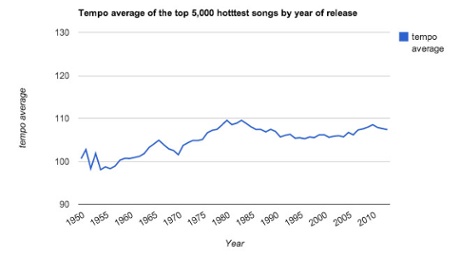The Guardian has just written a fascinating article looking at trends in pop music over the last six decades from an audio engineering perspective. It is based on The Echo Nest blog and shows things such as how music has got less acoustic over the decades, louder and and faster.

Tempo and quality
This reminded me of a study by Alex Wilson, a PhD student at the University of Salford, who for his final year project on our audio technology degree looked at changes in pop and rock music sound quality over a similar period.
As the graph below shows, Alex found that a slower music tempo is associated with higher sound quality. He suggested in his Dafx paper that this might be due to producers being able to apply higher production values to slower music. Think of a slow ballad where additional layers of strings or backing vocals are used to enrich the music.

Maybe this also extends to how the musicians play. Only last week my saxophone teacher was explaining how during fast passages I should do less and add more subtle expressive detail than in slow parts of the music. Do you agree? Please comment below.
0 responses to “Slower music has higher sound quality”
From Alex Wilson: There’s 30 seconds from this point that sum it up well, and i think this was one of the quotes that stuck with me over the years – a drummer describing what he had learned from their new producer and why a faster song wasn’t chosen as the lead single from an album because it didn’t benefit from the added production that a more mid-tempo song did. http://www.youtube.com/watch?v=gJvP8McfiwQ&feature=youtu.be&t=20m11s
There’s an interesting line in that paper.
“Previous work has suggested that in using commercially-successful music there was an automatic assumption of high-quality by listeners.”
I find this to be very true, and it works the other way too. It doesn’t take long on Youtube to find someone doing musically average covers of pop songs, but because it’s shot in HD, mixed really brightly and overcompressed people associate it with good music.
Chris